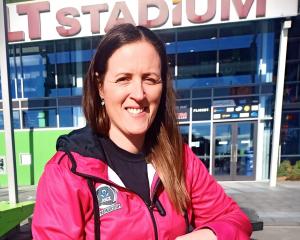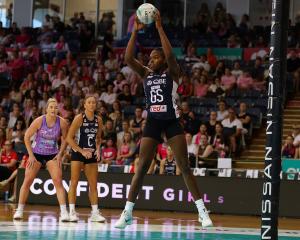• 1963 (Eastbourne, England)
New Zealand performed the haka and racked up some huge scores, including a 112-4 romp against Northern Ireland in its opening game. But the team in black lost the game that counted most - a 37-36 defeat to Australia - and had to be content with second place.
• 1967 (Perth, Australia)
Led by captain Judy Blair, whose daughter Belinda Blair played at the 1995 and 1999 tournaments, New Zealand was undefeated in seven games and claimed its first world title. The team survived a tough first-up encounter with South Africa, winning 41-39, and beat Australia 40-34 in its last and most crucial game.
• 1971 (Kingston, Jamaica)
Nine teams contested the third edition and like the earlier tournaments, the title was decided when New Zealand played Australia. New Zealand ran up massive totals against Northern Ireland, Scotland, Bahamas and Wales but faced stiffer opposition in England, Jamaica and Trinidad and Tobago.
Australia, though, proved too strong and won 48-42 to claim its second world title.
• 1975 (Auckland, New Zealand)
Expectations were high the Lois Muir-coached New Zealand side could win its second world title after a successful tour to England the previous year. But the English surprised the Silver Ferns during pool play with a 39-38 win. New Zealand drew with Australia in its last game and had to be content with third place, Australia taking the honours for a third time.
• 1979 (Port of Spain, Trinidad)
A dreadful oversight by the tournament organisers meant three teams shared the title.
New Zealand, Australia and Trinidad and Tobago all finished with one loss. There were no finals and the rules did not provide any other way of determining an outright winner. Interestingly, the New Zealand team featured four future national coaches in Yvonne Willering, Lyn Parker, Leigh Gibbs and incumbent Ruth Aitken.
• 1983 (Kent Ridge, Singapore)
The tournament was held in Asia for the first time and New Zealand sent a strong team. But the Silver Ferns were defeated 47-42 by Australia in the finals and finished second. Coach Lois Muir vowed to return and revenge would be sweet. For Australia, it was its fourth outright title and fifth in total.
• 1987 (Glasgow, Scotland)
The Cook Islands made a fine debut, finishing sixth out of 17 teams, and Trinidad and Tobago had a good tournament, finishing second equal with Australia. But New Zealand was in a class of its own, winning all 11 games with a star-studded line-up featuring Waimarama Taumaunu, Leigh Gibbs, Margaret Forsyth, Margharet Matenga, Tracey Fear, Sandra Edge and Rita Fatialofa.
• 1991 (Sydney, Australia)
Semifinals and a final were introduced for the first time and 20 teams contested the tournament. Early games were hideously one-sided affairs.
New Zealand dispatched nine different opponents during a protracted pool play phase and had little trouble getting past England in the semifinal.
Australia won a tense final 53-52.
• 1995 (Birmingham, England)
Roll up, roll up. A record 27 teams took part in the tournament - about four competed. The tournament was ridiculously bloated and the world body would not introduce a cap until 2007. Still, South Africa shocked New Zealand with a 59-57 win in pool play and a further loss to Australia saw New Zealand play the dreaded third-fourth playoff game - a 60-31 win against England. Australia beat South Africa in the final.
• 1999 (Christchurch, New Zealand)
The great choke. New Zealand was the hot favourite and led the final by six goals with 15min remaining.
Australia kept fighting and battled its way back. Sharelle McMahon scored in the final seconds to steal a dramatic 42-41 win, but only after New Zealand missed several attempts to seal the win for itself.
• 2003 (Kingston, Jamaica)
New Zealand won the tournament but did not win over a lot of friends for its controversial recruitment policy. Following the devastating loss in 1999 the Silver Ferns accepted South African captain Irene van Dyk, Samoan captain Sheryl Scanlan (nee Clarke) and Fijian captain Vilimania Davu into their ranks, and South African Leana de Bruin (nee du Plooy) also joined the multinational line-up. New Zealand beat Australia 49-47 in the final.
• 2007 (Auckland, New Zealand)
Fiji won the hosting rights but the tournament was shifted to New Zealand following a military coup in December 2006. Once again it came down to New Zealand or Australia, with the sides overcoming determined challenges in the semifinals against Jamaica and England respectively. Cracks appeared in the Silver Ferns' game early and Australia built a useful seven-goal lead by halftime and went on to win 42-38.








